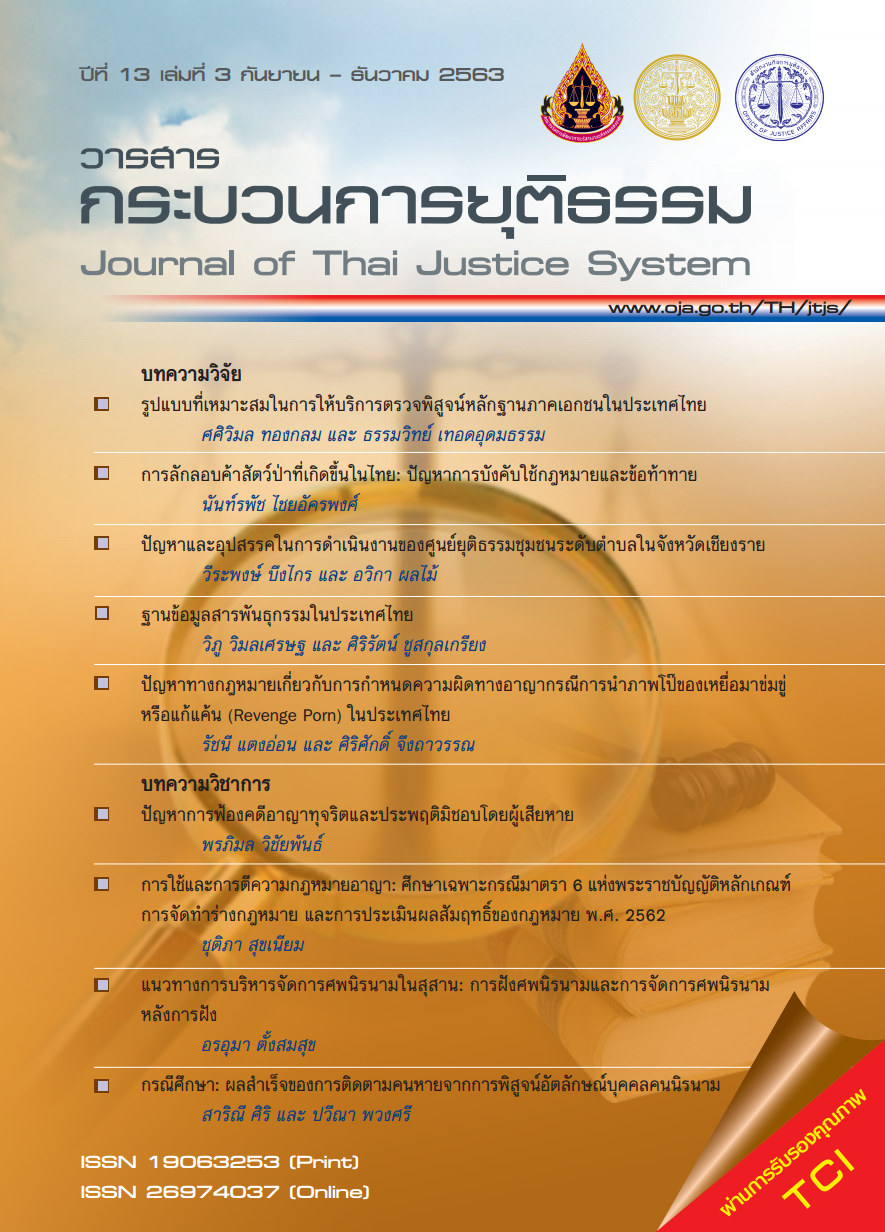รูปแบบที่เหมาะสมในการให้บริการตรวจพิสูจน์หลักฐานภาคเอกชนในประเทศไทย
Main Article Content
บทคัดย่อ
การศึกษาวิจัยเรื่องรูปแบบที่เหมาะสมในการให้บริการตรวจพิสูจน์หลักฐานภาคเอกชนในประเทศไทย มีวัตถุประสงค์เพื่อศึกษาสถานการณ์ ปัญหา และอุปสรรคการตรวจพิสูจน์หลักฐานในประเทศไทย มุมมองและทัศนะการขยายงานให้บริการตรวจพิสูจน์หลักฐานภาคเอกชนในประเทศไทย รวมถึงศึกษารูปแบบที่เหมาะสมในการให้บริการตรวจพิสูจน์หลักฐานภาคเอกชนในประเทศไทย โดยใช้การศึกษาวิจัยเชิงคุณภาพ ได้แก่ การศึกษาค้นคว้าเอกสาร การสัมภาษณ์เชิงลึก และการสนทนากลุ่ม ผลการศึกษาวิจัย พบว่า มีความเชื่อมั่นในผลการตรวจพิสูจน์และนำผลการตรวจมาใช้ประกอบการพิจารณาคดีในกระบวนการยุติธรรม มีการดำเนินการในภาคเอกชนแต่ยังไม่เป็นที่รู้จักมากนัก มีการพัฒนาเทคนิคและวิธีการตรวจพิสูจน์ มีกฎหมายส่งเสริมและสนับสนุนการให้บริการตรวจพิสูจน์ของภาคเอกชน และมีเครือข่ายร่วมดำเนินการ ในส่วนของปัญหาอุปสรรคและข้อจำกัด พบความไม่เพียงพอของทรัพยากร ได้แก่ งบประมาณ บุคลากร เครื่องมือ และการให้บริการยังไม่ครอบคลุม ขาดกฎหมายที่ให้อำนาจในการปฏิบัติงาน การปรับเปลี่ยนนโยบายผู้บริหาร ยังไม่มีระบบการจัดเก็บฐานข้อมูล รวมถึงความยากและความซับซ้อนของงาน มุมมองการขยายงานตรวจพิสูจน์ไปยังภาคเอกชน เป็นการลดภาระงานของภาครัฐแต่ต้องมีความน่าเชื่อถือและผ่านการรับรองมาตรฐานการตรวจพิสูจน์ ต้องคำนึงถึง ความซื่อสัตย์ของผู้ปฏิบัติงาน การเก็บความลับ ต้องมีหน่วยงานกำกับ รัฐต้องมีมาตรการสนับสนุนด้านงบประมาณ คำนึงถึงความเสี่ยงการลงทุนของภาคเอกชน และผู้วิจัยได้นำเสนอรูปแบบที่เหมาะสมในการให้บริการตรวจพิสูจน์หลักฐาน ในประเทศไทย คือ หน่วยงานรัฐที่รับผิดชอบทำหน้าที่ตรวจพิสูจน์เป็นหลักและเป็นผู้คัดกรองก่อนจัดส่งวัตถุพยานไปยังภาคเอกชน การออกรายงานและการรับรองผล ดำเนินการโดยหน่วยงานรัฐ การดำเนินการในลักษณะนี้เป็นการลดภาระด้านการตรวจพิสูจน์ของภาครัฐลง ผู้รับบริการมีความเชื่อมั่นในผลการตรวจพิสูจน์ซึ่งผ่านการตรวจรับรองโดยหน่วยงานรัฐ อีกทั้งยังมีหน่วยงานที่ทำหน้าที่กำกับควบคุมงานด้านการตรวจพิสูจน์เพื่อการกำกับควบคุมและติดตามการดำเนินงานด้าน การตรวจพิสูจน์ในประเทศไทย
Article Details
ต้นฉบับที่ได้รับการตีพิมพ์ในวารสาร เป็นลิขสิทธิ์ของวารสารกระบวนการยุติธรรม แต่ความคิดเห็นที่ปรากฏในเนื้อหาของบทความในวารสารกระบวนการยุติธรรม ถือเป็นความรับผิดชอบของผู้เขียนแต่เพียงผู้เดียว
เอกสารอ้างอิง
กิติมา ชุมอาจ และกมลพร กัลยาณมิตร. (2560). ความร่วมมือระหว่างภาครัฐและเอกชนในการพัฒนาแรงงาน กรณีศึกษาด้านการเขียนแบบและผลิตด้วยโปรแกรมคอมพิวเตอร์ในการผลิต. วารสารสถาบันการป้องกันประเทศ, 8(3), 102-110.
คณะวิทยาศาสตร์ประยุกต์. (2559). รายงานการวิจัยฉบับสมบูรณ์เรื่องการพัฒนาแนวทางการรับฟังพยานหลักฐานทางนิติวิทยาศาสตร์เพื่อพิสูจน์ความจริงในคดี. กรุงเทพฯ: สำนักงานศาลยุติธรรม.
จุไรลักษณ์ เอี้ยวพันธ์ และสาวิตรี วาระคำ. (2559). การวิเคราะห์การร่วมลงทุนระหว่างภาครัฐและภาคเอกชน (พิมพ์ครั้งที่ 3). กรุงเทพฯ: สำนักการพิมพ์สำนักงานเลขาธิการสภาผู้แทนราษฎร.
ชัยชาญ ไชยรังสินันท์. (2554). แนวทางการพัฒนาการบริหารระบบงานด้านนิติวิทยาศาสตร์ที่เหมาะสมสำหรับประเทศไทยโดยการปรับใช้ปรัชญาเศรษฐกิจพอเพียง. วิทยานิพนธ์ปริญญามหาบัณฑิตไม่ได้รับการตีพิมพ์. มหาวิทยาลัยมหิดล.
ไตรยฤทธิ์ เตมหิวงศ์. (2560). การพัฒนาแนวทางการใช้นิติวิทยาศาสตร์ประกอบการพิจารณาคดีของศาล: แนวทางการชั่งน้ำหนักพยานหลักฐานทางนิติวิทยาศาสตร์. กรุงเทพฯ: สถาบันพัฒนาข้าราชการฝ่ายตุลาการศาลยุติธรรม.
ธัญญานันท์ ศรีธรรมนิตย์. (2559). การบริหารทรัพยากรมนุษย์ที่มีประสิทธิภาพของโรงพยาบาลเอกชน. ปริญญาบริหารธุรกิจมหาบัณฑิต. มหาวิทยาลัยธรรมศาสตร์.
วราภรณ์ พรมวิกร, สุธิดา สุวรรณรังษี, ไกรสร อัมมวรรธน์, สุนทรี บูชิตชน และน้ำแท้ มีบุญสล้าง. (2562). ความน่าเชื่อถือของพยานหลักฐานทางนิติวิทยาศาสตร์: ปัญหาสาเหตุ และแนวทางการพัฒนาส้ำหรับประเทศไทย. วารสารเทคโนโลยีภาคใต้, 12(2), 168-180.
สหการณ์ เพ็ชรนรินทร์. (2556). แนวทางการพัฒนาและการจัดการงานนิติวิทยาศาสตร์ที่เหมาะสมของประเทศ. กรุงเทพฯ: สำนักงานศาลยุติธรรม.
อมรเทพ พลศึก. (2560). การพัฒนาความร่วมมือในงานด้านนิติวิทยาศาสตร์: กรณีศึกษาการพัฒนาคุณภาพตามระบบมาตรฐานสากล. วิทยานิพนธ์นิติวิทยาศาสตร์และงานยุติธรรมปรัชญาดุษฎีบัณฑิต. มหาวิทยาลัยศิลปากร.
หนังสือต่างประเทศ
Osborne, D., & Gaebler, T. (1992). Reinventing government. New York: Plume of Penguin Books.


